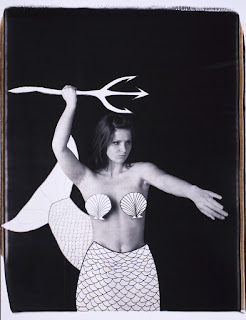When it came time to register for classes, I had friends who
strongly recommend that I try the class. Their reasoning was “when will you
ever get the chance to work with this camera once you leave Mass Art”. Rita
Lombardi and Caitlin Duennebier were the two biggest influences to attempt this
course.
Artwork by Caitlin Duennebier
The 20x24 Polaroid class was very different from all the other photography classes taught at Mass Art. We met for about three weeks went over the camera, its history, lighting, and the business of photography. This was the only business training mass art taught and it was in a single class meeting. This knowledge alone was worth the tuition of the class. After our first 3 meetings were over, a shooting schedule was made and off we went.
My new dilemma was “what to shoot”. I had never worked in a
studio environment before and was clueless on what I would work on for my
shoot. I have always doodled and drawn silly cartoons and thought this would be
a great opportunity to make them a reality with photography. I decided to
combine real people with cartoon elements in themes revolving around and in the
ocean. About the same time of my class I was reading “20,000 Leagues Under the
Sea” by Jules Verne.
This novel along with the silliness of “The Life Aquatic” by Wes Anderson was
great inspiration in developing each one of my shots.
Untitled, John 2009 © Traverse Day Robinette
Thus “The Seven Seas” was born. I worked in a sketch book drawing out each shot of how I wanted the model to stand and the positions for lighting. Again this was all very new and different from any form of portraiture I have done. I wanted the props to be made from white cardboard with the details drawn in with a black marker. I was not concerned with hiding the sticks supporting the props other than painting them black. The purpose of this was to keep the images looking as much like a cartoon as possible.
Untitled, Katrina 2009 © Traverse Day Robinette
As my shoot approached I worked on drawing and cutting out the props which turned out to be very time intensive. The night of my shoot was chaotic and amazing. It was like being on a movie set and I was the director. I told the models what to do and had many extras help with holding props into the frame. I honestly don’t remember everyone who was in the room that night, but many people helped and without their help the shoot would not have gone as smoothly as it did.
Untitled, Melissa 2009 © Traverse Day Robinette
I attempted two horizontals. The camera is built to only take verticals and is so large you can not lift and turn the camera on its side. This leaves only one option, you have to change the way your subject inters the frame. The toughest was a self-portrait where I laid half of my body on a box and had my feet held so I could be in the frame. The other was of Wole lying on his back with his legs up in the air and I turned the image after the shot was made.
Untitled, Self Portrait 2009 © Traverse Day Robinette
Untitled, Wole 2009 © Traverse Day Robinette
The shoot lasted about two hours and was over before I knew it. Once everything started rolling it went so fast. Months of planning coming together at last and it was over before I knew it. The photographs hung on the wall to dry, friends said their goodbyes and I was alone in an empty room with my five images. I was mentally and physically drained from the demand of the shoot. Yet I sat there on a high for what a rush it was to work with that gigantic camera!





